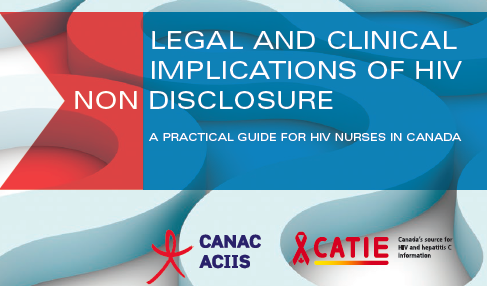
A new guide which aims to address some of the realities and complexities faced by nurses and others who provide care to people living with HIV in Canada, is now available.
Covering everything from record keeping, confidentiality, viral load and safer sex to search warrants, subpoenas and testifying in court, it offers practical advice to HIV nurses and helps clarify their professional obligations regarding isues around HIV (non)disclosure and the criminal law.
Developed by the Canadian Association of Nurses in AIDS Care (CANAC) in partnership with CATIE (Canadian AIDS Treatment Information Exchange), it was written in February 2013, four months after the release of the Supreme Court of Canada decisions in the cases of R. v. Mabior and R. v. D.C.
The guide is an extremely important resource at a very difficult and confusing time in Canada – not only for people living with HIV, but also those who work with, or advocate for them. Although the guide covers legal and scientific complexities around (non)disclosure that are specific to the Canadian context, it may also be helpful for HIV service providers in other jurisdictions. At the very least, this is a ‘best practice’ model for others to emulate.
This excerpt from the introduction provides a good overview of the content and tone of the guide, which can be ordered and/or downloaded from the CATIE website.
In the current Canadian legal context, it is important for nurses to maintain trust and therapeutic relationships with clients, to preserve a safe space for clients to talk about HIV disclosure issues, and to recognize that real-life experiences of HIV disclosure are far more complex than the idealized representation of disclosure expressed in the criminal law.† Furthermore, it is important for nurses to continue providing excellent nursing care across the HIV healthcare continuum from prevention through diagnosis and treatment to care and support.
Research papers, reports and grey literature all point to the challenges of providing nursing care given the current legal context. In these circumstances, it seems particularly prudent for nurses to clarify their role and responsibilities as members of the healthcare team and to have a clear understanding of their own obligations with respect to HIV non/disclosure.
It would certainly be helpful for nurses to use this guide as a tool to engage other members of the healthcare team and identify their respective roles and responsibilities.
This guide was primarily developed to support nurses who provide care to people living with HIV in Canada and offer some guidance on how to meet professional standards when dealing with non/disclosure in nursing practice. Guidance may not provide a definitive answer or indicate a correct course of action in a given circumstance. However, nurses should be aware that existing legal, ethical and professional frameworks can be relied upon to respond in a professionally sound manner to key questions and concerns.
There are areas of nursing practice that will remain uncertain, so it is important for nurses to work on a case-by-case basis in collaboration with the other members of the healthcare team, seek guidance when necessary, initiate referrals to legal services when required, engage in reflective practice, and be mindful of their professional obligations. Laws, professional standards and policies can change at any time. It is important for nurses to remain aware of any new developments because these will inform their own professional obligations.